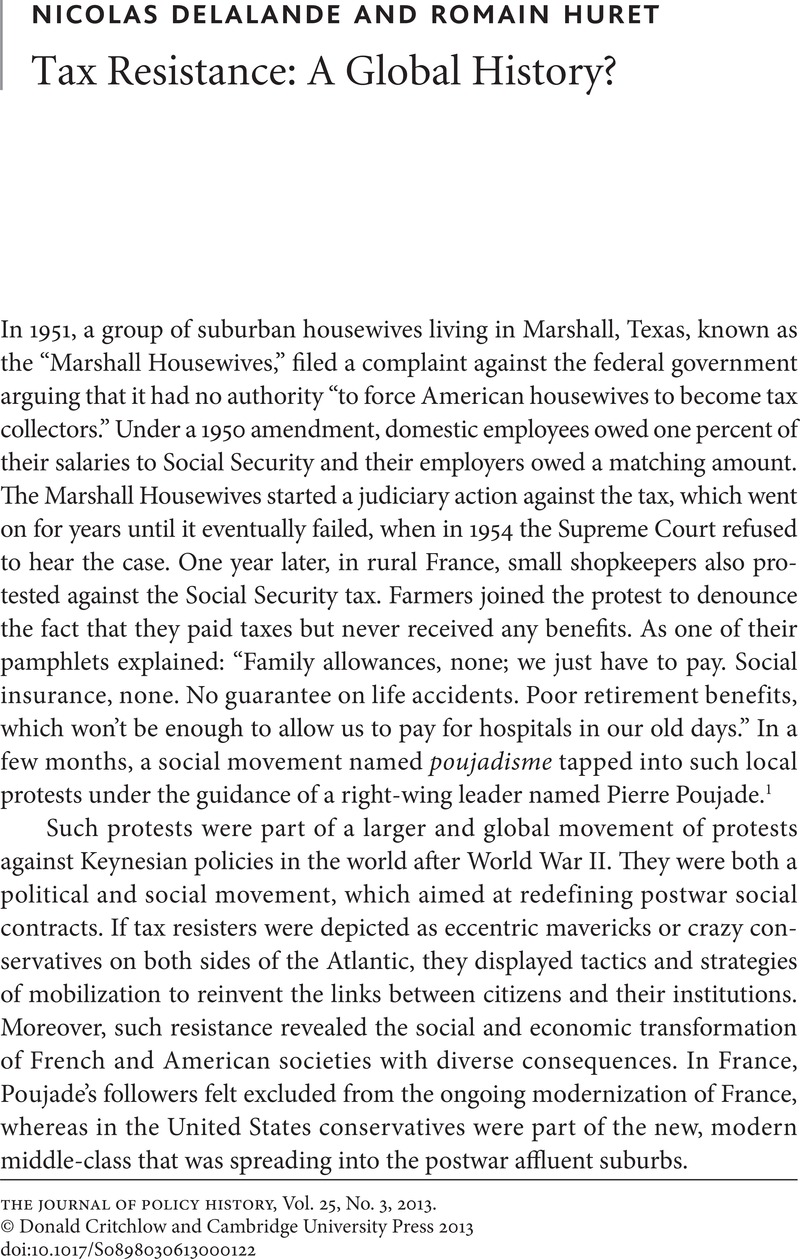Article contents
Tax Resistance: A Global History?
Published online by Cambridge University Press: 17 June 2013
Abstract

- Type
- Introduction
- Information
- Copyright
- Copyright © Donald Critchlow and Cambridge University Press 2013
References
Notes
1. On the Marshall Housewives, see Huret, Romain, A Republic Without Taxpayers? American Tax Resisters from the Civil War to the Present (Cambridge, Mass., forthcoming)Google Scholar; on poujadisme, see Souillac, Romain, Le Mouvement Poujade: De la défense professionnelle au populisme nationaliste (1953–1962) (Paris, 2003)Google Scholar; Delalande, Nicolas, Les batailles de l’impôt: Consentement et résistances de 1789 à nos jours (Paris, 2011).CrossRefGoogle Scholar
2. Tarrow, Sidney and Tilly, Charles, Contentious Politics (Oxford, 2006).Google Scholar
3. For a recent synthesis on the notion of taxpayers’ consent, see also The New Fiscal Sociology: Taxation in Comparative and Historical Perspective, ed. William Martin, Ajay K. Mehrotra, and Monica Prasad (New York, 2009), 1–27.
4. On examples of tax resistance and tax compliance, see Bergman, Marcelo, “Tax Reforms and Tax Compliance: The Divergent Paths of Chile and Argentina, ” Journal of Latin American Studies 35 (2003): 593–624CrossRefGoogle Scholar. Clarence, Y. H. Lo, Small Property versus Big Government: Social Origins of the Property Tax Revolt (Berkeley and Los Angeles, 1990)Google Scholar; Martin, William Isaac, The Permanent Tax Revolt (Palo Alto, 2008).CrossRefGoogle Scholar
5. On this notion of formal and informal privileges, see Martin, The Permanent Tax Revolt, 6–8.
6. On this issue of trust, see Levi, Margaret, Consent, Dissent, and Patriotism (Cambridge, 1997)CrossRefGoogle Scholar; Slemrod, Joel, Why People Pay Taxes: Tax Compliance and Enforcement (Ann Arbor, 1992)Google Scholar; Daunton, Martin, Trusting Leviathan: The Politics of Taxation in Britain, 1799–1914 (Cambridge, 2001).Google Scholar
7. On propaganda and taxpayers’ culture, see Jones, Carolyn, “Mass-Based Income Taxation: Creating a Taxpaying Culture, 1940–1952, ” in Elliot Brownlee, W., Funding the Modern American State, 1941–1945: The Rise and Fall of the Era of Easy Finance (New York, 1996), 121–38.Google Scholar
8. Quotation in Martin, Mehrotra, and Prasad, The New Fiscal Sociology, 1.
9. “Incivisme fiscal . . . is a productive event in which the concepts, metaphoric relationships, and suppositions that serve to theorize and hence delineate the most appropriate means and ends of power are challenged, reviewed, and reconfigured. Although a moment of political conflict, it cannot be reduced to the mere jockeying of social groups for control over material resources,” in Roitman, Janet, Fiscal Disobedience: An Anthropology of Economic Regulation in Central Africa (Princeton, 2005)CrossRefGoogle Scholar, 8. For a similar approach, see also Hmed, Choukri, “Les mouvements sociaux et la politisation de l’argent public, ” in Gouverner (par) les finances publiques, ed. Bezes, Philippe and Siné, Alexandre (Paris, 2011), 225–62.CrossRefGoogle Scholar
10. See Levi, Margaret, Of Rule and Revenue (Berkeley and Los Angeles, 1988).Google Scholar
11. Wong, Roy Bin, “Tax Resistance, Economy, and State Transformation in China and Europe, ” Economics of Governance 2 (2001): 69–83CrossRefGoogle Scholar; see also Rocca, Jean-Louis, “L’Etat entre chiens et loups: Résistance anti-taxes et racket fiscal en Chine populaire, ” Etudes chinoises 11, no. 2 (1992): 77–140CrossRefGoogle Scholar; Bernstein, Thomas P. and Lü, Xiaobo, Taxation Without Representation in Contemporary Rural China (New York, 2003)CrossRefGoogle Scholar; Bianco, Lucien, Peasants Without the Party: Grassroots Movements in Twentieth-Century China (Armonk, N.Y., 2001).Google Scholar
12. Tompson, E. P., “The Moral Economy of the English Crowd in the Eighteenth Century, ” Past and Present 50, no. 1 (1971): 76–136.CrossRefGoogle Scholar
13. Scott, James C., “Resistance Without Protest and Without Organization: Peasant Opposition to the Islamic Zakat and the Christian Tithe, ” Comparative Studies in Society and History 29, no. 3 (1987): 412–36CrossRefGoogle Scholar; and Weapons of the Weak: Everyday Forms of Peasant Resistance (New Haven, 1985).
14. Redding, Sean, Sorcery and Sovereignty: Taxation, Power, and Rebellion in Rural South Africa, 1880–1963 (Athens, Ohio, 2006).Google Scholar
15. For this kind of interpretation, on a recent African case, see Kelsall, Tim, “Governance, Local Politics, and Districtization in Tanzania: The 1998 Arumeru Tax Revolt, ” African Affairs 99 (2000): 533–51CrossRefGoogle Scholar. The author counters the idea according to which this rural tax revolt was a triumph of “popular participation” and a sign of discontent toward corrupt political leaders. On the contrary, he insists on the role played by local elites, on their “machinations,” and their attempts at strengthening their local networks.
- 4
- Cited by




